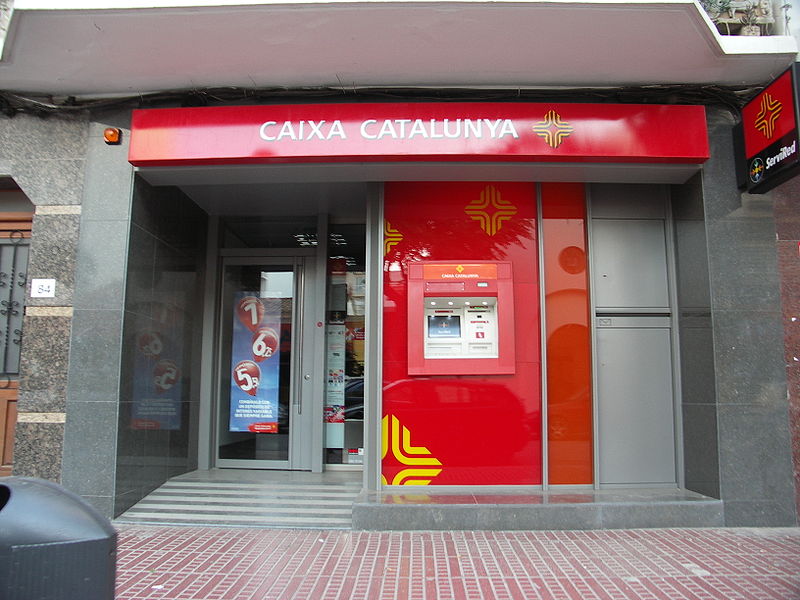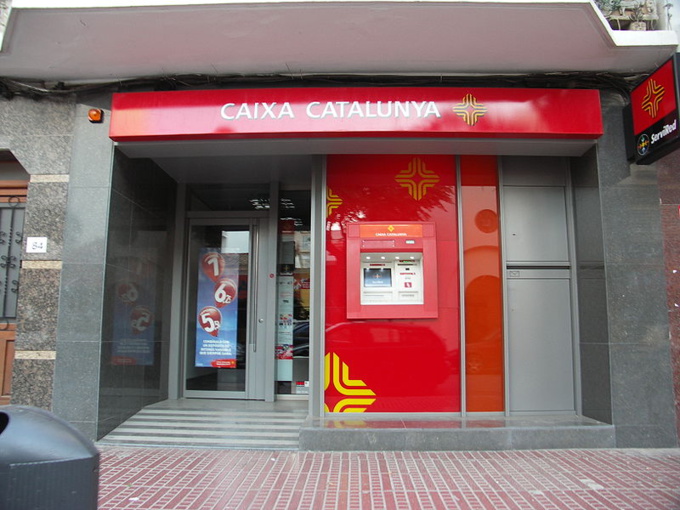Civil society organizations in Catalonia are requiring a massive withdrawal of money from bank ATMs to put pressure on the Spanish government. At the same time, the organizers have no clear idea how much money it takes and what to do with them later. The action is aimed at five major banks in Catalonia: Caixa Bank, Sabadell, Bankia, BBVA and Santander. The organizers are calling on clients of Caixa Bank and Sabadell with an appeal to demonstrate their disagreement with the banks’ recent decision to move their headquarters.
This is the first "direct and peaceful" event, organized by Crida per la Democràcia ("Call for Democracy"). This is a group that includes, among other things, the two main organizations of independence in Catalonia: Catalan National Assembly and Òmnium Cultural. The massive withdrawal of funds is also aimed at condemning the arrest of the presidents of Catalan National Assembly and Òmnium Cultural, who are currently being detained.
No one reacted after the banks announced their departure from Catalonia as everyone was engaged in the referendum and its consequences. Now, however, the banks are remembered, and their tough position can cost them dearly.
Now we have to find out how much the Spanish banking system is stable and solvent. But we can say for sure that the region’s banks will have some problems with cash.
It is unclear how many people will support the appeal. However, if we assume that most of those who follow CAN’s Twitter are ready do this, this will become an impressive act of protest for Catalonia, since now the region has 7.5 million people out of 47 million of the total population of Spain. Catalonia is the second largest population in Spain after Andalusia (8.4 million people). In addition, it is the country’s richest region.
The change in the legal status of financial institutions in Catalonia can lead to something more serious than simply worrying about the outflow of deposits from the country. Banks are still supported by Spain, and then the ECB, and they intend to keep this state of things.
The key link is CaixaBank SA, an effective Catalan company that has an impact on the entire Spanish economy. After the board meeting on Friday, the leaders decided to transfer the legal base of the bank to Valencia. Banco de Sabadell SA, also based in Catalonia and carrying out operations in the rest of Spain, as well as abroad, has already announced its intention to transfer.
Caixa Group is the largest shareholder in 6 of the 24 largest companies in Spain. Among them are former telephone monopoly Telefonica SA, oil company Repsol SA, energy distributor Gas Natural SDG SA, road operator Abertis Infraestructuras SA and telecommunications operator Cellnex Telecom SA, making it the most powerful holding in Spain. In addition to these companies there are a large number of small ones that can also go away.
Therefore, the fact that Catalonia pays out 8.8 billion euros more taxes than it receives can quickly change, and the region generally will not have the means to operate.
At the same time, the Spanish news agency EFE reported that the government of Catalonia considers it possible to preserve the region within the European Union and the eurozone even with independence, so the central bank of Catalonia will be established "as a monetary body of the new country" with 500 employees.
This statement so far does not seem very reliable, although the EFE cites as evidence a document that was prepared by the vice-presidency and economy and finance department. The paper details the future of the Catalan economy in conditions of independence.
A situation, in which the ECB will not let Catalonia into the euro area, is not yet discussed. Meanwhile, this means the impossibility of preserving the euro on the territory of the republic, which, in turn, prompts to crypto-currencies.
source: reuters.com
This is the first "direct and peaceful" event, organized by Crida per la Democràcia ("Call for Democracy"). This is a group that includes, among other things, the two main organizations of independence in Catalonia: Catalan National Assembly and Òmnium Cultural. The massive withdrawal of funds is also aimed at condemning the arrest of the presidents of Catalan National Assembly and Òmnium Cultural, who are currently being detained.
No one reacted after the banks announced their departure from Catalonia as everyone was engaged in the referendum and its consequences. Now, however, the banks are remembered, and their tough position can cost them dearly.
Now we have to find out how much the Spanish banking system is stable and solvent. But we can say for sure that the region’s banks will have some problems with cash.
It is unclear how many people will support the appeal. However, if we assume that most of those who follow CAN’s Twitter are ready do this, this will become an impressive act of protest for Catalonia, since now the region has 7.5 million people out of 47 million of the total population of Spain. Catalonia is the second largest population in Spain after Andalusia (8.4 million people). In addition, it is the country’s richest region.
The change in the legal status of financial institutions in Catalonia can lead to something more serious than simply worrying about the outflow of deposits from the country. Banks are still supported by Spain, and then the ECB, and they intend to keep this state of things.
The key link is CaixaBank SA, an effective Catalan company that has an impact on the entire Spanish economy. After the board meeting on Friday, the leaders decided to transfer the legal base of the bank to Valencia. Banco de Sabadell SA, also based in Catalonia and carrying out operations in the rest of Spain, as well as abroad, has already announced its intention to transfer.
Caixa Group is the largest shareholder in 6 of the 24 largest companies in Spain. Among them are former telephone monopoly Telefonica SA, oil company Repsol SA, energy distributor Gas Natural SDG SA, road operator Abertis Infraestructuras SA and telecommunications operator Cellnex Telecom SA, making it the most powerful holding in Spain. In addition to these companies there are a large number of small ones that can also go away.
Therefore, the fact that Catalonia pays out 8.8 billion euros more taxes than it receives can quickly change, and the region generally will not have the means to operate.
At the same time, the Spanish news agency EFE reported that the government of Catalonia considers it possible to preserve the region within the European Union and the eurozone even with independence, so the central bank of Catalonia will be established "as a monetary body of the new country" with 500 employees.
This statement so far does not seem very reliable, although the EFE cites as evidence a document that was prepared by the vice-presidency and economy and finance department. The paper details the future of the Catalan economy in conditions of independence.
A situation, in which the ECB will not let Catalonia into the euro area, is not yet discussed. Meanwhile, this means the impossibility of preserving the euro on the territory of the republic, which, in turn, prompts to crypto-currencies.
source: reuters.com



















